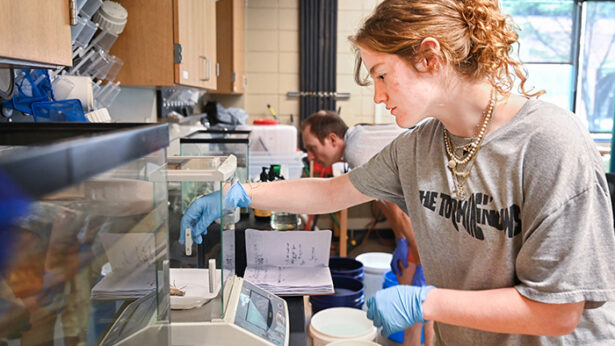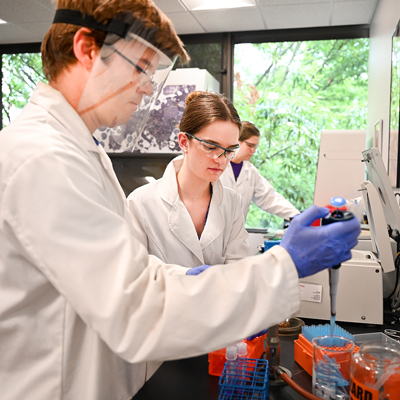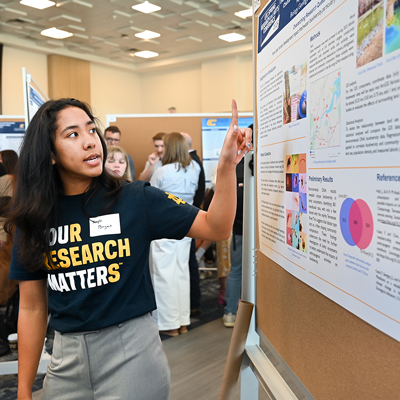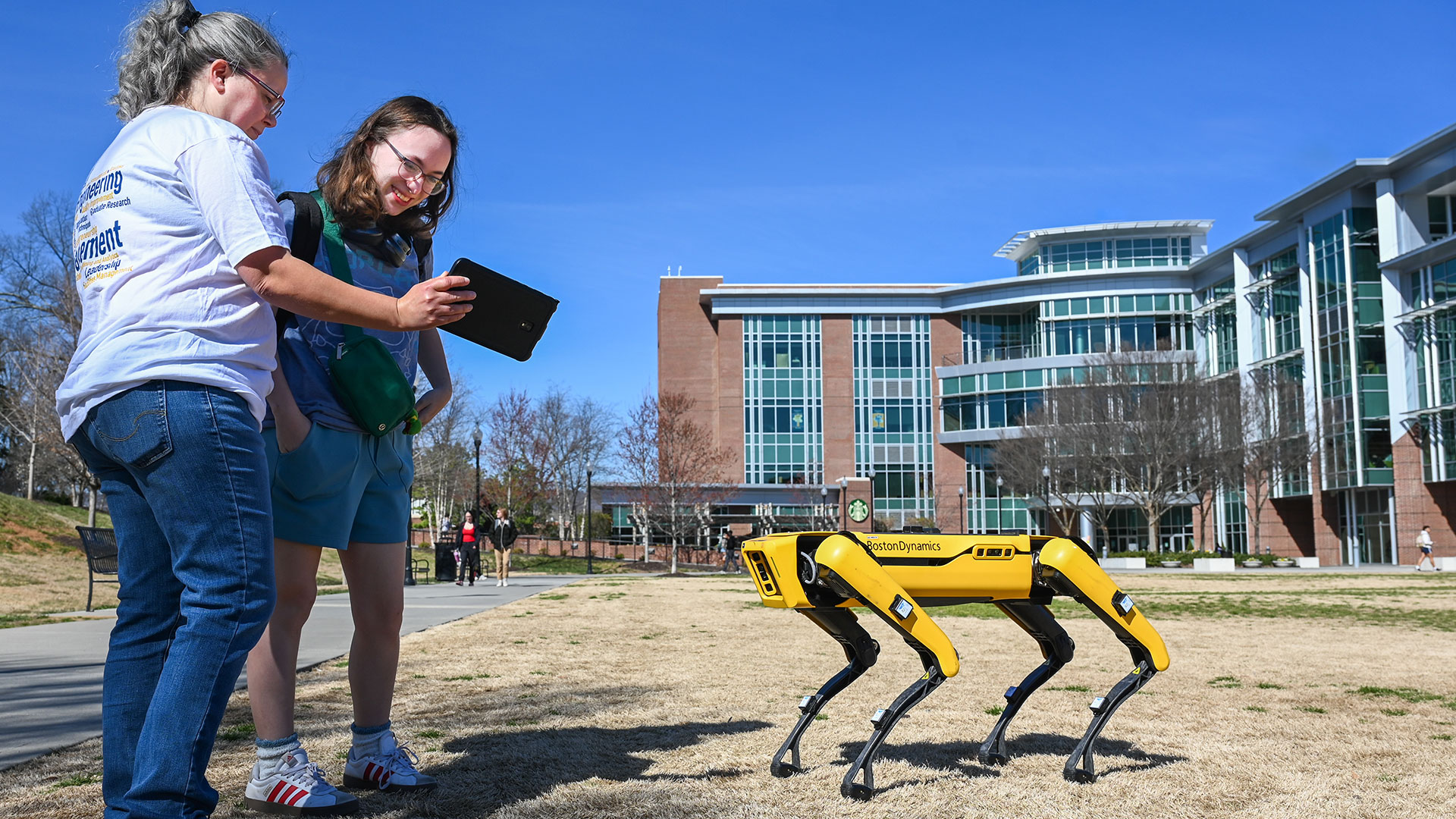Gillian Morton developed a passion for research while studying at UT Chattanooga.
Working alongside faculty researchers, the biology major and Brock Scholar in the UTC Honors College began conducting microbiology wet lab research during her first semester on campus. Since then, she explored a range of scientific fields, from clinical metabolomics and environmental toxicology to public health fieldwork at the Gerace Research Centre in the Bahamas.
“I was really lucky to start doing research shortly after coming to UTC,” says Morton, a Nashville native. “It’s been invaluable. I realized I genuinely love it, and I want it to be part of my life. It has opened my eyes to all of the possibilities of what I can do in science.”
Chancellor Lori Bruce wants experiences like Morton’s to be the norm.
“When a faculty member is actively practicing their discipline through research, the classroom benefits. Students benefit,” Bruce says. “When a student is getting to participate in the research and be at the cutting edge of their discipline, it’s even more powerful.”
To Bruce, research rests on three interconnected pillars—grantsmanship, discovery and scholarship. Together, these define what it means to create and share new knowledge.
“Most really impactful research is multidisciplinary. It requires people from different disciplines working together to help drive innovative solutions.”
—UTC Chancellor Lori Bruce
“You’re discovering something that’s never been done before,” says Bruce, who began her tenure as chancellor on June 30. “You’re broadening the knowledge base of humankind. It could be something very grandiose or something very niche, but if you stop and think about that, it’s extraordinary.”
That three-part model forms the foundation of Bruce’s vision for UTC. A longtime researcher and academic leader who secured more than $20 million in funding for her own research and has overseen more than $100 million in federal and industry funding as a campus leader, she believes research is not just a faculty pursuit: It’s a student experience, a regional asset and a cultural force.
Grantsmanship, she explains, is about securing the resources to fuel that work. Discovery is the process of creating new knowledge. And scholarship is the critical act of sharing it—whether through peer-reviewed journals, conference papers or public engagement—so that others can build on it.
“It really doesn’t help mankind if I go in a lab and make a discovery, and I tell no one,” Bruce says. “The dissemination of knowledge is how progress happens. Someone else reads your work and builds on it, and then someone else builds on theirs. That process—that constant pursuit—is what makes research so impactful.
“And very few people are able to do research that significantly addresses society’s challenges by going into their office and working in isolation. Most really impactful research is multidisciplinary. It requires people from different disciplines working together to help drive innovative solutions.”



Click to Expand Images
UTC is well-positioned to foster that kind of collaboration, she says. The university is big enough to house diverse areas of expertise but small enough for people to know and collaborate with one another.
The result: “We have the expertise, and we have the agility,” Bruce says. “That makes UTC a great partner.”
She points to research already underway in areas such as mobility systems, quantum technologies, artificial intelligence and public health. On one of her first days at UTC, she observed how electrical engineering, computer science, civil engineering and public policy were collaborating on a Smart City initiative focused on pedestrian safety and urban transportation planning.
“When you work on a project that big in scope,” she says, “you’re going to get the best solution when you bring together a lot of different disciplines.”
Bruce is championing UTC’s pursuit of R2 status from the Carnegie Classification of Institutions of Higher Education—a designation reserved for universities with high research activity. Reaching that milestone will require expanding doctoral programs and increasing the number of Ph.D. graduates.
“We’re not trying to become something we’re not,” she says. “We’re trying to grow into what we already are—an institution where research and teaching go hand in hand and where students benefit from both.”
She lights up describing her early research with undergraduates—from algorithms that help radiologists detect cancer to satellite imaging for precision agriculture. The key, she says, is tying complex concepts to real-world challenges that students care about.
“What I love about research is that is isn’t just experiments in a lab. It’s asking questions, observing the world and connecting science to people’s lives.”
—Gillian Morton
“I never met a student who didn’t get excited about medical imaging,” Bruce says. “They want to learn difficult math or physics if they know it’s going to help someone. That kind of application motivates them.”
She says research builds soft skills—project management, budgeting, teamwork, communication—that grow alongside students’ academic knowledge and prepare them for graduate school or the workforce.
Hope Klug, a Guerry and UC Foundation professor of biology, has seen those benefits firsthand.
“At UTC, we’re really lucky because we have so many cutting-edge researchers who take students into the field or into the lab to use state-of-the-art techniques,” Klug says. “Students get a sense of what it’s really like to do science, and that puts them at a huge advantage whether they’re going into grad school, medical school or straight into the workforce.”
Morton plans to continue her studies next year in graduate school with the hopes of becoming a physician assistant.
“What I love about research is that it isn’t just experiments in a lab. It’s asking questions, observing the world and connecting science to people’s lives,” she says. “During my time at UTC, I’ve worked on projects related to hypertension and food insecurity in rural communities, and I’ve learned how social and environmental factors impact health outcomes. That’s the kind of research that matters to me. You’re trying to improve real people’s lives.”
“Whether it’s AI, history, GIS or literature, research allows students to make discoveries that matter to them—and that’s when the light bulb comes on,” Bruce says. “You’re searching for new discoveries.”
Research, Bruce says, belongs to everyone.



